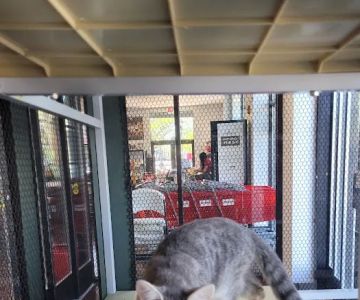- 1. Understanding Dehydration in Pets
- 2. Signs of Dehydration in Pets
- 3. Causes of Dehydration in Pets
- 4. How to Treat Dehydration in Pets
- 5. When to Seek Veterinary Care for Dehydration
- 6. Preventing Dehydration in Pets
- 7. Conclusion and Recommendations
1. Understanding Dehydration in Pets
Dehydration is a serious condition that can affect pets of all kinds, from dogs and cats to smaller animals like rabbits and guinea pigs. Just like humans, pets rely on proper hydration to maintain bodily functions such as temperature regulation, digestion, and circulation. Dehydration occurs when an animal loses more fluids than it takes in, which can lead to severe health complications if left untreated.
Pets can become dehydrated for various reasons, including not drinking enough water, excessive heat, illness, or physical activity. While dehydration is a common issue, it is often overlooked by pet owners until it becomes severe. Recognizing the signs of dehydration early and addressing it promptly is essential for ensuring your pet’s health and well-being.
2. Signs of Dehydration in Pets
Dehydration in pets can show up in several ways. As a pet owner, it’s important to know what to look for so you can take action before the situation becomes critical. Here are some common signs of dehydration in pets:
- Dry or Sticky Gums: One of the most noticeable signs of dehydration is dry or sticky gums. Normally, your pet’s gums should be moist and slippery to the touch. If they feel dry, it could be a sign that they are dehydrated.
- Loss of Skin Elasticity: Another classic sign of dehydration is a loss of skin elasticity. You can test this by gently pinching the skin at the back of your pet’s neck or between their shoulder blades. In a hydrated pet, the skin will snap back quickly. If the skin stays tented or doesn’t return to normal quickly, it’s a sign of dehydration.
- Sunken Eyes: Dehydrated pets may have sunken or dull eyes. This is especially true in more severe cases, where the pet is significantly dehydrated.
- Increased Heart Rate and Panting: Dehydrated pets may show signs of distress such as a rapid heartbeat or heavy panting. If your pet is panting excessively without exertion, dehydration could be the cause.
- Loss of Appetite: Dehydration can cause pets to lose their appetite. If your pet refuses food or water, it’s important to monitor their condition closely.
- Excessive Urination or Diarrhea: If your pet is experiencing diarrhea or is urinating excessively, they could be losing more fluids than they are taking in. This can quickly lead to dehydration.
If you notice any of these signs in your pet, it’s crucial to address the situation immediately to prevent further health complications.
3. Causes of Dehydration in Pets
There are several reasons why a pet may become dehydrated. Understanding the underlying causes can help you prevent dehydration and keep your pet healthy. Here are some common causes of dehydration in pets:
- Inadequate Water Intake: One of the most straightforward causes of dehydration is simply not drinking enough water. This may occur if your pet’s water bowl is not accessible, or if they have a preference for certain types of water or containers.
- Heat and Humidity: High temperatures, especially during the summer months, can cause pets to lose fluids through excessive panting. Pets can become dehydrated more quickly in hot and humid conditions, making it important to keep them cool and hydrated during the warmer months.
- Illness: Illnesses such as vomiting, diarrhea, or fever can cause pets to lose significant amounts of water. Pets with kidney disease, diabetes, or other chronic conditions are also at higher risk of dehydration.
- Excessive Physical Activity: Pets that engage in vigorous physical activity, especially in warm weather, may sweat or pant excessively, leading to dehydration. This is particularly true for high-energy dogs and pets that love to exercise outdoors.
- Medications: Some medications, such as diuretics, can increase urine output, which may lead to dehydration if your pet is not drinking enough to compensate.
Identifying the cause of your pet’s dehydration can help you address the root issue and prevent future occurrences.
4. How to Treat Dehydration in Pets
If you suspect that your pet is dehydrated, it’s important to treat the condition promptly. The treatment for dehydration depends on the severity of the situation, but here are some general guidelines for treating dehydration in pets:
- Offer Fresh Water: The first step in treating mild dehydration is to encourage your pet to drink water. You can try offering water from a clean, fresh bowl, or use a syringe or dropper to gently administer water if your pet is reluctant to drink on their own.
- Electrolyte Solutions: In more severe cases, offering an electrolyte solution designed for pets can help replenish lost fluids and minerals. These solutions are available at most pet stores or veterinary clinics.
- Wet Food: If your pet is refusing to drink water, offering wet food (such as canned food or broth) can provide additional hydration. Mixing a bit of water into dry food can also increase their fluid intake.
- Subcutaneous Fluids: In cases of moderate to severe dehydration, your veterinarian may administer fluids under your pet’s skin (subcutaneously). This helps rehydrate them quickly and efficiently, especially in pets who are unable to drink or keep water down.
- Veterinary Care: If your pet is severely dehydrated or showing signs of shock, immediate veterinary attention is required. Your vet may need to provide intravenous fluids and monitor your pet’s condition to prevent further complications.
If you are unsure of the severity of your pet’s dehydration, it is always best to consult with your veterinarian for guidance and treatment.
5. When to Seek Veterinary Care for Dehydration
While mild dehydration can be treated at home, there are instances where veterinary care is required. You should seek professional help if:
- Your pet is not drinking or eating for more than 24 hours.
- They show signs of severe dehydration, such as sunken eyes, excessive panting, or lethargy.
- The dehydration is caused by an underlying illness, such as vomiting, diarrhea, or fever.
- Your pet’s skin elasticity is significantly diminished, and they are unable to recover quickly.
- Your pet is having trouble breathing or shows signs of shock (weak pulse, collapse).
In these situations, it’s important to get veterinary care as soon as possible to prevent further health complications.
6. Preventing Dehydration in Pets
Preventing dehydration in pets is easier than treating it. Here are some proactive steps you can take to help keep your pet hydrated:
- Provide Fresh Water: Always ensure that your pet has access to fresh, clean water. Refill their water bowl regularly and place it in an easily accessible location.
- Encourage Water Intake: If your pet doesn’t drink much water, try adding ice cubes to their water bowl or offering flavored water (such as water with low-sodium broth) to entice them to drink more.
- Keep Pets Cool in Hot Weather: During hot months, provide plenty of shaded areas and cool places for your pet to rest. Avoid excessive exercise during peak heat hours, and always bring water for them during walks or outings.
- Monitor Health Conditions: Keep an eye on pets with chronic health issues, as they are more prone to dehydration. Regular vet check-ups are essential to catch any potential problems early.
By staying proactive about your pet’s hydration, you can reduce the risk of dehydration and keep your pet healthy and comfortable year-round.
7. Conclusion and Recommendations
Dehydration in pets is a serious condition that can lead to major health complications if left untreated. As a pet owner, it’s important to recognize the signs of dehydration early and take appropriate action to address it. Offering fresh water, using electrolyte solutions, and seeking veterinary care when necessary are essential steps in treating and preventing dehydration in pets.
For more information and personalized advice on your pet's hydration needs, consider consulting with the team at Hidden Brook Veterinary. They can provide expert care and guidance on how to keep your pet healthy and hydrated, ensuring a happy and long life together.











